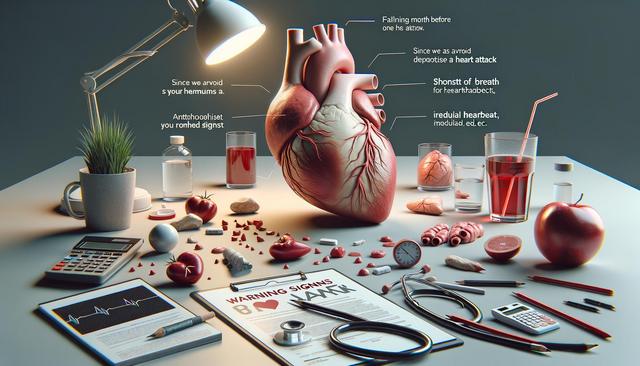Understanding the Importance of Early Detection
Heart disease remains one of the leading causes of death worldwide. However, many people overlook the fact that the body frequently sends out warning signs weeks before a major cardiac event like a heart attack. These early symptoms are often subtle and easy to dismiss, which is why awareness is so critical. A heart attack doesn’t typically strike without warning. Recognizing the signs that can present up to a month in advance may help individuals seek timely medical attention and potentially prevent serious outcomes.
It’s important to understand that these symptoms can vary from person to person. While some might experience noticeable changes, others may only have minor discomforts. Regardless of how minor they seem, these signs should be taken seriously, especially if you are at risk for heart disease due to factors like high blood pressure, diabetes, smoking, or a family history of cardiovascular conditions.
Unusual Fatigue and Sleep Disturbances
One of the most overlooked early warnings of a potential heart attack is unusual fatigue. This type of fatigue is not related to physical exertion or lack of sleep. It is a persistent and overwhelming tiredness that doesn’t improve with rest. Often described by patients as feeling “drained” or unusually weak, this symptom can occur well before any chest pain or other typical signs of a heart problem.
In addition to fatigue, many individuals report disturbances in their sleep patterns in the weeks leading up to a heart attack. These changes can include:
- Difficulty falling asleep despite feeling tired
- Waking up multiple times during the night
- Feeling unrested even after a full night’s sleep
These symptoms are believed to be connected to the body’s stress response and changes in blood circulation, which may signal that the heart is under strain.
Shortness of Breath and Dizziness
Experiencing shortness of breath, especially during light activity or while at rest, can be an early sign of a heart issue. This symptom occurs when the heart struggles to pump blood efficiently, depriving the lungs and other organs of adequate oxygen. It is often accompanied by a feeling of tightness in the chest or a sensation of being unable to take a deep breath.
In some cases, individuals might also feel lightheaded or dizzy. These episodes can be brief but recurring, and they may indicate that the heart is not delivering enough blood to the brain. When these symptoms appear together, they become especially concerning and warrant a visit to a healthcare provider.
Other associated symptoms to watch for include:
- Sudden episodes of weakness
- Fainting or feeling faint
- Rapid or irregular heartbeat
Digestive Issues and Nausea
Many people don’t associate digestive symptoms with heart problems, but they can be a surprising early warning sign. Indigestion, stomach pain, or nausea occurring without a clear cause—such as food poisoning or a stomach virus—can sometimes be misinterpreted when the real issue lies with the heart.
These symptoms may arise due to reduced blood flow to the digestive system, which occurs when the heart is struggling to circulate blood effectively. This can result in:
- Feeling bloated or full even after eating small amounts
- Frequent burping or stomach discomfort
- Unexplained nausea or vomiting
While often benign, persistent gastrointestinal distress in combination with other symptoms like fatigue or shortness of breath should be evaluated by a doctor, especially if you’re in a high-risk group for heart disease.
Chest Discomfort and Pain in Other Areas
Although chest pain is widely recognized as a sign of a heart attack, it often manifests differently in the early stages. The discomfort may not be intense or constant; it can feel like pressure, squeezing, or fullness, and may come and go over several weeks. This pain is not always centered in the chest—it can radiate to other parts of the body as well.
Pay attention to discomfort in the following areas:
- Neck or jaw
- Back or shoulders
- Arms, particularly the left arm
These sensations might be mild and are often mistaken for muscle strain or stress. However, when combined with other symptoms mentioned above, they should not be ignored. Documenting when and how often these discomforts occur can help medical professionals pinpoint the underlying issue more effectively.
Emotional and Mental Health Changes
Changes in emotional well-being can also be an early signal of an impending heart event. Many individuals report experiencing heightened anxiety or a sense of doom weeks before a heart attack. This isn’t just regular stress—it’s an unshakable feeling that something is wrong, even when there’s no clear reason for it.
Other psychological symptoms might include:
- Sudden mood changes
- Increased irritability
- Feeling unusually nervous without cause
These emotional changes may stem from the body’s physiological response to poor cardiac function. If you or someone you know is experiencing these feelings alongside physical symptoms like fatigue or shortness of breath, it’s worth seeking medical advice.
Conclusion: Listening to Your Body Can Save Your Life
Your body has a way of signaling when something isn’t right, and these early signs can be critical in preventing a heart attack. Recognizing and responding to these symptoms—such as extreme fatigue, shortness of breath, digestive issues, or emotional changes—can provide the opportunity to seek help before a serious event occurs.
If you are experiencing any combination of these warning signs, especially if you have existing risk factors, don’t dismiss them. Consult with a healthcare professional, undergo appropriate tests, and take proactive steps to protect your heart health. Being attentive to your body’s messages can truly make a life-saving difference.


